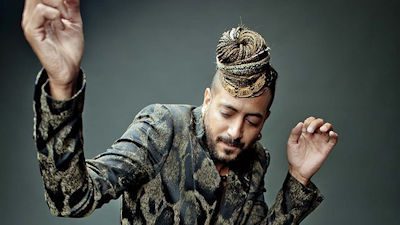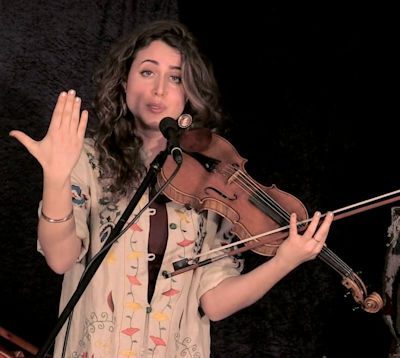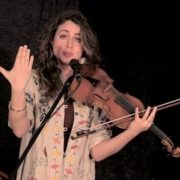YEMEN BLUES WITH CHLOE POURMORADY ENSEMBLE
YEMEN BLUES WITH CHLOE POURMORADY ENSEMBLE
Pico Union Project Los Angeles – March 25, 2017 – 7:30pm
Loud, Proud, and Still Draws a Crowd
 “It doesn’t matter where you come from, your language is my language” (Ravid Kahalani)
“It doesn’t matter where you come from, your language is my language” (Ravid Kahalani)
Iran, Somalia, Sudan, Syria, Libya—and Yemen—those are the six countries left on the president’s new travel ban, once he removed Iraq to try to get around the original objections to his original ban on seven Muslim countries. I guess his son-in-law Jared Kushner neglected to mention that there were some Jews in Yemen—500—from which the four-member band Yemen Blues was formed. Thanks to a Seattle judge from the 9th Circuit Court of Appeals—the most liberal appeals court in the country—a temporary restraining order was placed on the new ban, and Yemen Blues four devout Jews were able to travel to the States and keep their booking last night at downtown Los Angeles’ Pico Union Project—housed in what had once (from 1909 to 1925) been Sinai Temple, which then became a Presbyterian church, and most recently (in February 2013) was purchased by Los Angeles songwriter, musician and visionary recording artist Craig Taubmen—whose inspiring plan was to use it for multicultural, interfaith performances of the kind I saw and enjoyed. Bravo to that judge—for enabling Yemen Blues to get here.
And yet, maybe some members of their former nine-piece band never got the message that the ban was lifted—and didn’t get on the plane. There were only four on stage—their drummer, electric bassist, keyboardist and lead singer and oud player Ravid Kahalani.
The last time I saw Yemen Blues was November 15, 2012 at UCLA’s Royce Hall, the premiere university concert venue in Los Angeles. Tonight they appear downtown at The Pico Union Project—and they are clearly more in their own cultural element than at the sedate, high brow cross-town concert hall. Pico Union Project describes itself as follows:
“The Pico Union Project is dedicated to the Jewish principle to “love your neighbor as yourself.” It elevates this teaching into practice in a historic building by bringing diverse cultures together through song, story, art, food and prayer. Pico Union Project is a multi-faith cultural arts center and house of worship founded in 2013 by visionary recording artist, composer and musician Craig Taubman. Pico Union Project aims to help invigorate the community of Los Angeles and reflect the Jewish value of being a light to all nations.”
The audience managed to stay seated for only three songs—and then—with the encouragement of both their lead singer Ravid Kahali and impresario Craig Taubman–they began to respond viscerally to the joyful noise emanating from the stage of the Pico Union Project and start to rise triumphantly to their feet and start a line dance throughout the former temple until virtually the entire roomful of 400 (filled to capacity) spiritual Yemenites were embracing, singing and dancing the blues. It was a sight to behold. For this sedentary listener-only 70-year-old audience of one, seated comfortably in the back row, it felt like an anthropological expedition to a strange country to study the mores of a musical culture far removed from my guitar-banjo-and fiddle-based American folk roots—much like Margaret Mead would have encountered the exotic members of Samoa during her quixotic search for coming-of-age rituals of a primitive tribe.
That indeed was so utterly charming I couldn’t help but feel drawn backwards in time to the Jews of primitive Aramaic exiled in the desert struggling to maintain their culture with the only tools at their disposal—handmade instruments and homemade music and dance. It was an inspiration to both listen to the dark-hued Arabic/Jewish/Afro/Moroccan/ French Creole and even Delta blues textures of their songs and watch the affectionate handholding and torso embraces of young people for whom this was tantamount to a night at the Hollywood Bowl in the early days of rock and roll. If my generation came of age during Beatlemania, this was not that far removed; call it Yemen Bluesmania. It was indeed a joyful noise, just like the Lord commanded. From Facebook: “The collective is a true collaboration of top master musicians, its core including Ravid Kahalani, Itamar Doari, Rony Iwryn, Shanir Blumendranz and Itamar Borochov.”
Despite the broad eclectic banner of “multicultural and interfaith”, however, this was pretty much an exclusively Jewish audience and—the band’s name notwithstanding—it was an entirely Israeli and US group of musicians on stage. What can I say? I hate to rain on anyone’s parade, but the story with which I began this review turns out to be a lovely fiction, and no one had any questions about whether they would be able to board El Al and travel to the US. Once I discovered this, however, I felt even more enthusiasm for what is more of a marketing ploy than a literal description of their hybrid ethnic music. After all, if they called themselves Israeli Blues rather than Yemen Blues, they would be hard-pressed to create their unique place in the sun, having to compete with how many Israeli folk bands and groups like the Yuval Ron Ensemble. As Yemen Blues, though, they have the stage to themselves, and carry a bit of ancient mythology to every show they do—as the remnant of an ancient tribe of Yemenite Jews—of whom fewer than five hundred remain. It’s a stroke of genius—that’s what it is—and I encourage you not to tell if you want to bring a friend the next time they are in town—which can’t be too soon for me.
Their inspired musical arranger is bass player Omer Avital, and even without their horn section, they raise the roof just the way their larger version did at Royce Hall five years ago. The Almanac Singers were similar to Yemen Blues in that respect—when you booked them you never knew who or how many would show up. It might be six or seven; it might be two or three. You might be lucky and get Bess Lomax and Butch Hawes and Millard Lampell as well as Pete and Woody, but sometimes it might be just Pete and Woody—and whoever was in town. This stripped down version of Yemen Blues had one band member I don’t remember from Royce Hall—a keyboard player who was so raucous he put me in mind of the Killer—Jerry Lee Lewis. That made the night for me—I half expected him to jump up and start dancing on the keyboards and piano. It was thrilling.
 And the opening 7-piece Chloe Pourmorady Ensemble was a perfect choice to “warm up the stage,” as Chloe Pourmorady modestly described their assignment. With a stage full of instruments in the same idiom as the headliners—oud, standup bass, middle-eastern percussion, and Chloe’s impassioned violin playing and soulful singing, they set the perfect tone for the entire show—even though they had time to play only three songs before winding up their set. They left with a standing ovation and demands for an encore, which Craig added to when he joined them on stage and insisted they perform. Bravo!
And the opening 7-piece Chloe Pourmorady Ensemble was a perfect choice to “warm up the stage,” as Chloe Pourmorady modestly described their assignment. With a stage full of instruments in the same idiom as the headliners—oud, standup bass, middle-eastern percussion, and Chloe’s impassioned violin playing and soulful singing, they set the perfect tone for the entire show—even though they had time to play only three songs before winding up their set. They left with a standing ovation and demands for an encore, which Craig added to when he joined them on stage and insisted they perform. Bravo!
According to Lewis Gropp on Facebook: “Chloe fuses soulful Persian roots with Balkan, rock, classical and avant-garde sensibilities. A unique combination of instruments including violin, clarinet, Persian tar, darbouka, bass, jarana, guitar, daf, and more highlight the enormous talents of Zack Lodmer, Jerry Summers, Eskandar Alexander Meimand, Ava Nahas, Daniel Raijman, Marcel Borbon, and Ramin Abrams.”
We saw them as the opening act, but only last December they were the featured ensemble at Skirball Center. Chloe’s music is often based on her father’s lyrics, as in “Bipayan” (Endless) – music written by Chloe Pourmorady, lyrics by Kourosh Pourmorady.
Noting that Chloe’s roots are in Persia, and the language in which she sings is often Farsi, which for the Department of Homeland Security means Iran—the first country on their list of terrorist nations identified in the president’s travel ban mentioned at the beginning of this review—only heightens our appreciation of the fact that they are already here—and did not have to face being turned back at the airport. Indeed, if you treasure Middle Eastern music you can take comfort in the fact that one Seattle judge was able to erect a firewall around a ban that would have prevented us from hearing anything but Western and European music for the next four years. And now that the National Endowment for the Arts is also at the point of being completely defunded, should the president’s proposed budget get passed, it is incumbent upon the local arts community (including FolkWorks readers) to step in with all the support we can muster. If not now, when?
Had not Eric Clapton been battling severe bronchitis and had to cancel and postpone his Forum show I would have missed Yemen Blues. But this comparatively small 400-seat former synagogue transformed into a concert auditorium was rockin’ like the Forum tonight, I guarantee. I look forward to Clapton’s rescheduled concerts in September (see FolkWorks “Everything but…” page for the details), but I’m glad I did not miss Yemen Blues tonight. With no Fender Stratocaster in sight, and musical foreign languages forged into their own style and sensibility, they brought the blues to us brimming with life. They are great! Thank you Craig Taubman and his Pico Union Project for bringing them all back home.
Pico Union Project hosts its third annual Downtown Seder—an interfaith, multi-cultural celebration of freedom for all—Sunday April 9—3:30-5:30pm; 1153 Valencia St. 90015; tickets Dayenu!
Friday, March 31 at 8:00pm Ross Altman performs in Beyond Baroque Literary Arts Center’s 80th anniversary celebration of the poetry and songs of the Spanish Civil War; 681 Venice Blvd., Venice, CA 90291; 310-822-3006; $10
Saturday, April 1, 1:00 to 5:00pm Ross Altman performs in Theatricum Botanicum’s fourth annual tribute to Pete Seeger, $25
L.A. folk singer Ross Altman has a PhD in Modern Literature from SUNY-Binghamton and is a member of Local 47; Ross may be reached at greygoosemusic@aol.com













